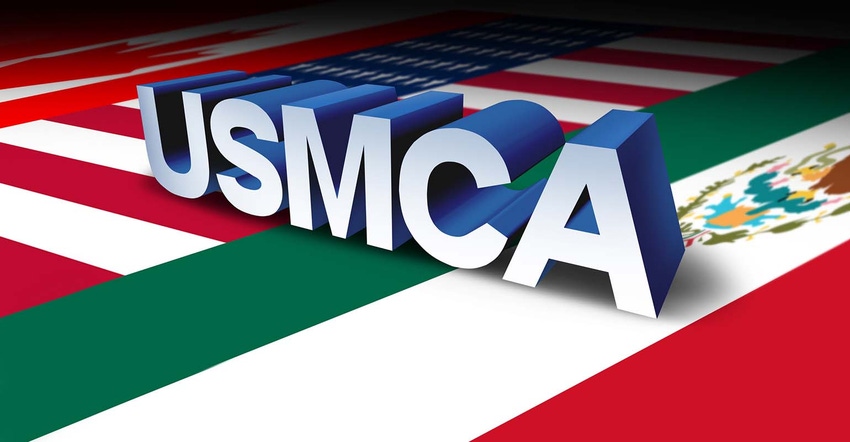USMCA takes effect July 1
Implementation and enforcement now focus of trade deal implementation with Canada and Mexico.

The U.S.-Mexico-Canada Agreement (USMCA) goes into effect July 1 -- at a crucial time for farmers and ranchers struggling to recover from COVID-19 losses and a depressed agricultural economy.
On Tuesday, one day prior to USMCA entering into force, House Agriculture Committee chairman Collin Peterson (D., Minn.), Sen. Joni Ernst (R., Iowa) and U.S. agricultural leaders held a virtual roundtable to discuss the importance of USMCA to farmers, rural communities and agricultural exports.
Under USMCA, Canada will increase quotas on U.S. dairy products, which will benefit American dairy farmers by $242 million. Canada will also treat wheat imports the same as domestic wheat for grading purposes. Mexico has also agreed that all grading standards for agricultural products will be non-discriminatory. The agreement additionally enhances science-based trading standards among the three nations.
The expected $2 billion annual increase in U.S. agricultural exports and overall increase of $65 billion in gross domestic product will provide a welcome boost, the American Farm Bureau Federation said.
Peterson praised the successful outcome of the trade deal. “Thank God we got it done when we did,” at the start of 2020, he said during a trade call hosted by the Farmers for Free Trade coalition on Tuesday afternoon.
Peterson did note the need to be vigilant and make sure the agreement is enforced as intended “after seeing some troubling signs of people using COVID to put up trade barriers” as well as some “monkey business going on in Mexico.” He said he continues to worry about problems with Canada's implementation of dairy regulations.
The U.S. Department of Agriculture estimates that COVID-19 contributed to a $50 billion decline in commodity values alone for 2019, 2020 and 2021 production totals. This does not include all of the agriculture industry’s losses, which would be billions more.
“The launch of the USMCA brings optimism to the country’s farmers and ranchers at a time they need it the most,” American Farm Bureau Federation president Zippy Duvall said. “We’re grateful for the opportunity to build on the success of the North American Free Trade Agreement, and we’re eager to see the results on America’s farms. It’s important that our neighbors uphold their end of the deal so the agreement provides a stabilizing force amid the unpredictability of a pandemic in all three countries.”
Ernst said the updated North American trade pact makes positive advancements for Iowa's dairy and egg producers, "where we see significant strides forward over past deal.” She added that Canada and Mexico are a wonderful success of bipartisanship, and she hopes it will lead to many more trade deals in the future. “First one down, and many more to go,” she said.
More work needed
USMCA is not a magic bullet for all of the challenges facing agriculture, the Farm Bureau noted. A University of Florida study shows Mexico gaining ground in shipments of produce like tomatoes, strawberries and bell peppers. USMCA does not alter the rules for imports of produce from Mexico. The Farm Bureau said it supports U.S. Trade Representative and USDA field hearings to receive grower input on the issue.
“As with all trade agreements, there are some areas that still need attention,” Duvall said. “We will continue to work with the Administration to level the playing field for fruit and vegetable growers facing increased competition from Mexico.”
Rep. Ron Kind (R., Wis.) said the work doesn’t stop when an agreement is signed, but it is just the beginning, and he's watching closely to see how the implementation goes, especially as it relates to dairy, poultry, eggs and labor requirements as well as sanitary and phytosanitary issues. “I’ll be following very closely on oversight and implementation so farmers can see the full benefit,” Kind said of USMCA.
After speaking with USTR Ambassador Robert Lighthizer just last week, Rep. Jim Costa (D., Cal.) said Lighthizer feels confident that the U.S. has the tools necessary to enforce the negotiated USMCA. “We now have enforcement mechanisms in place and will determine whether the trade deal is structured in a way to settle our disputes and build on that trade,” Costa said.
About the Author(s)
You May Also Like




